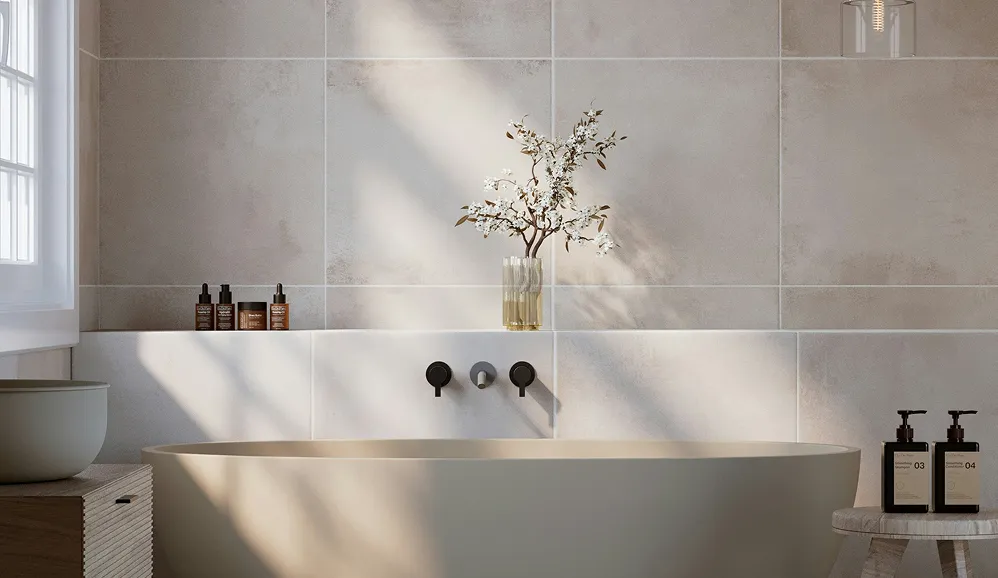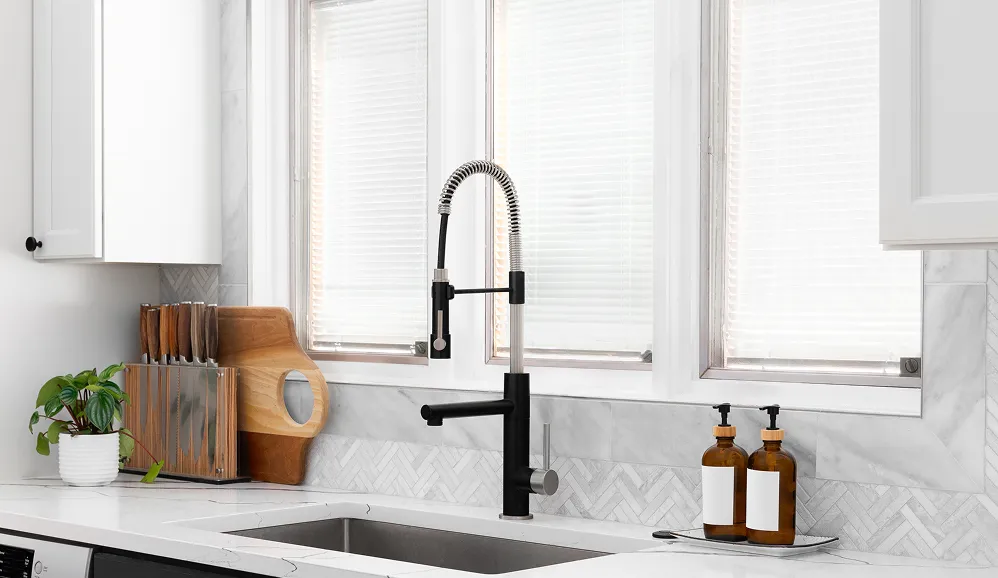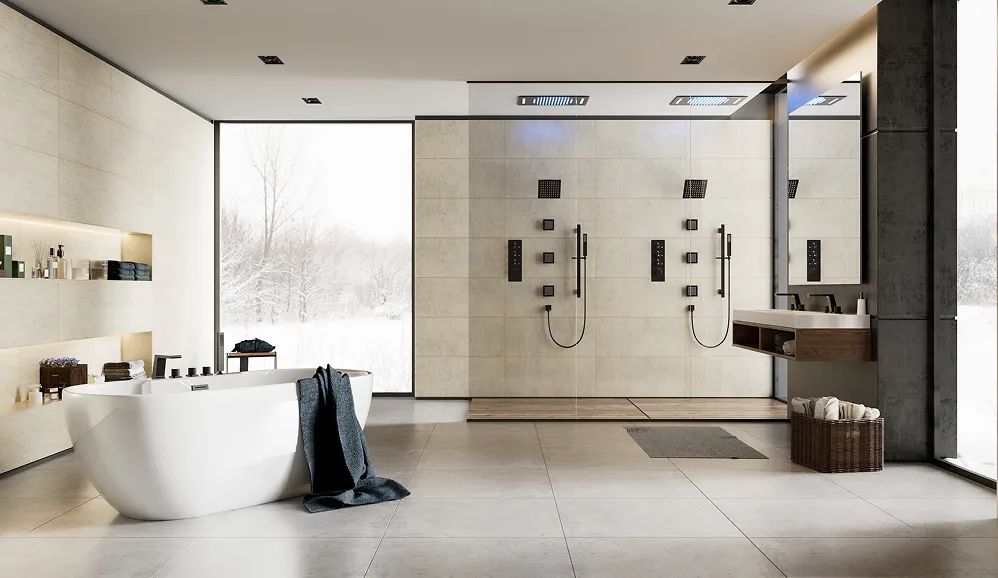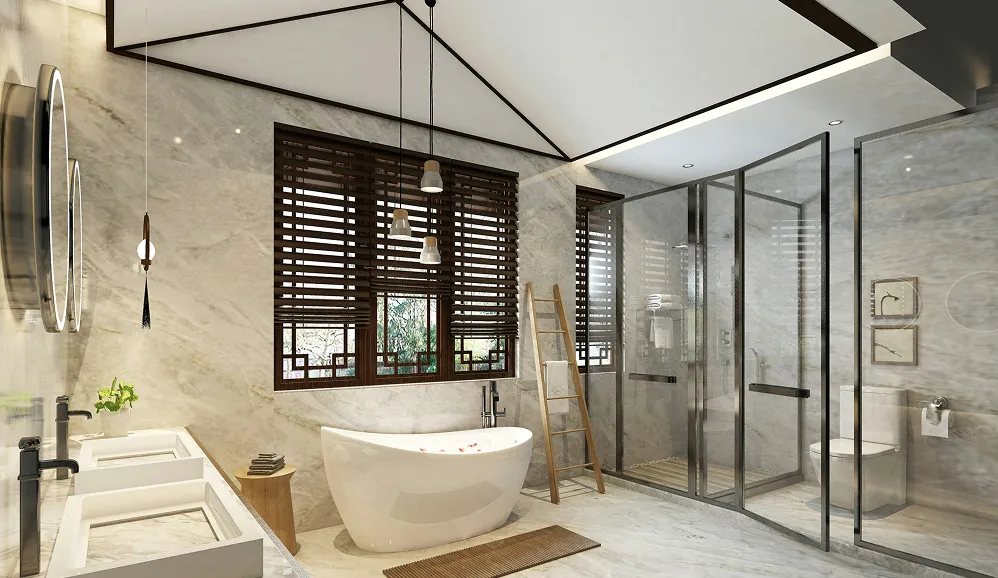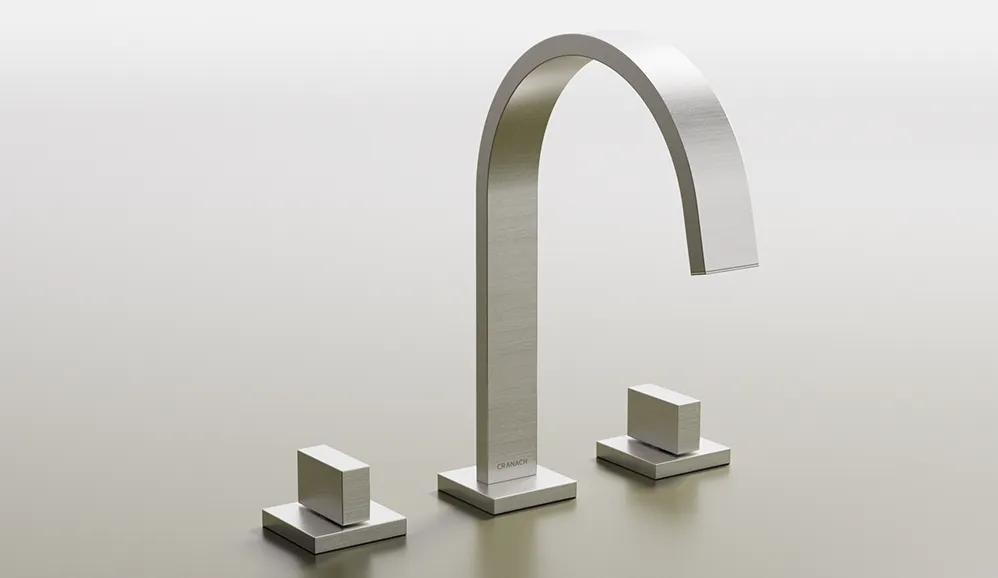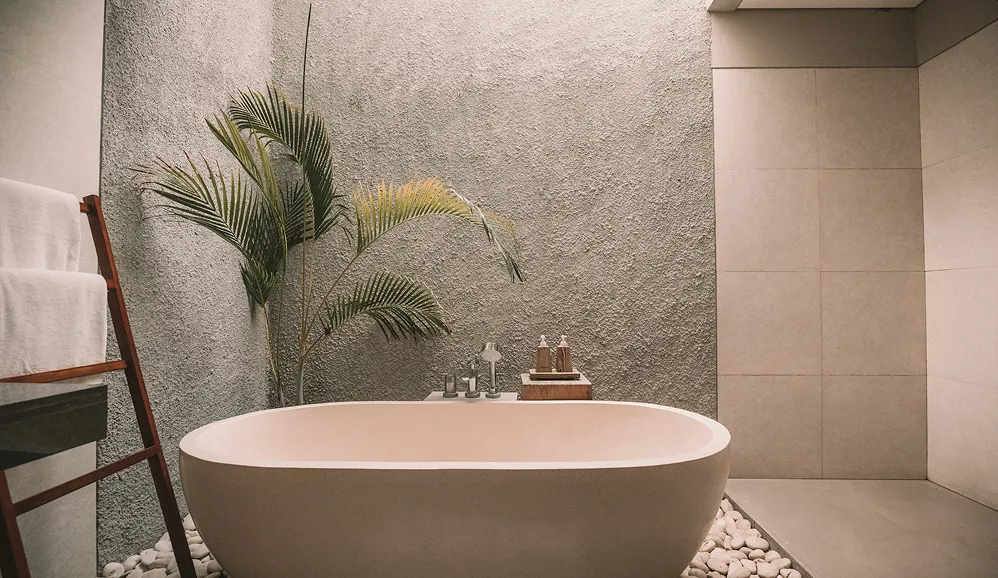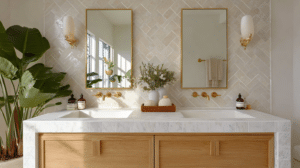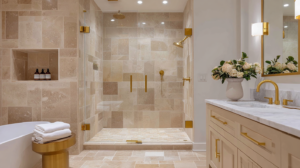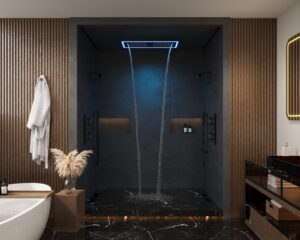Trying to pin down how much to remodel a bathroom shower can feel like you're trying to hit a moving target. To give you a ballpark idea, a straightforward refresh usually starts in the $1,500 to $4,000 range. If you're dreaming of something more involved, like a custom walk-in shower, you're likely looking at a budget between $5,000 and $10,000. And for those truly luxurious, spa-inspired sanctuaries, costs can easily climb past $12,000.
Think of these numbers as your financial starting blocks. They're what you build your entire renovation plan on.
Understanding Your Shower Remodel Cost
Before you fall in love with a specific tile or get your heart set on a rainfall showerhead, it’s really important to get a handle on the costs. This simple step helps you set a realistic budget from the get-go and keeps those surprise expenses from derailing your project later.
A shower remodel isn't a one-price-fits-all kind of deal. The final invoice is a direct result of every choice you make—from the materials and fixtures you select to how much you change the existing layout.
Typical Project Tiers and Costs
Homeowners are putting more money into their bathrooms than ever before, and shower renovations are leading the charge. As of 2025, the price for these projects can swing pretty dramatically depending on what you have in mind.
Industry data shows that a basic shower update typically lands between $1,500 and $4,000. This level of work might involve swapping out the showerhead and faucets, or maybe retiling the walls. For more substantial mid-range projects—think a new walk-in shower with a sleek frameless glass door—the average cost is $5,000 to $10,000. If you’re going all out with a luxury remodel, complete with custom tile designs and high-end features, expect to spend $12,000–$25,000 or even more.
Figuring out where your vision falls in these tiers is the key. For a deeper dive, our guide on how much it costs to remodel a bathroom shower breaks it all down even further.
Key Takeaway: Your shower remodel budget is a sliding scale. A simple fixture swap is a minor expense, but a full tear-out with custom tile and a new shower system represents a significant investment.
To make this even clearer, I’ve put together a simple table. It lays out what you can generally expect at each price point, helping you match your dream shower to a realistic budget.
Estimated Shower Remodel Costs by Project Tier
| Project Tier | Typical Cost Range | Common Features |
|---|---|---|
| Basic | $1,500 – $4,000 | New showerhead, retiling over existing surfaces, basic prefabricated stall. |
| Mid-Range | $5,000 – $10,000 | Frameless glass door, quality porcelain tile, upgraded shower system. |
| Luxury | $12,000 – $25,000+ | Custom tile work, walk-in design, high-end fixtures from CRANACH, bench seating. |
This table should give you a solid foundation for your budget. It shows how features directly influence the overall cost, from a simple facelift to a complete, custom transformation.
Key Factors Driving Your Remodel Cost
The final price tag for your shower remodel isn't one single number—it's a collection of all the little and big decisions you'll make. Getting a handle on what moves the needle on cost is the first step for anyone asking, how much to remodel a bathroom shower? Think of it like planning a vacation; the final cost depends on whether you're flying first-class or economy, staying in a luxury resort or a cozy rental, and eating at five-star restaurants or local cafes.
At its core, the biggest cost driver is simply the scope of your project. Are you giving the space a quick facelift, or are you tearing it down to the studs for a total overhaul? The difference is massive. A simple retiling job is worlds away from a full gut renovation.
Project Scope and Shower Size
The bigger your plans, the bigger your budget needs to be. It's a direct relationship. A surface-level update—maybe some new fixtures and reglazing the existing tile—will naturally keep you on the lower end of the cost spectrum.
But if you’re talking about a full tear-out that involves ripping out old walls, pouring a new shower pan, and installing a new waterproofing system, you're in a completely different ballpark. That’s a much larger and more expensive project.
The physical size of your shower is another huge piece of the puzzle. A larger footprint demands more of everything: more tile, more grout, more backer board, and, of course, more hours of labor to put it all together. Remodeling a standard 3×3 foot shower stall will always be cheaper than creating a spacious 4×6 foot walk-in oasis.
According to the National Association of the Remodeling Industry (NARI), the project's size and complexity are the two most significant variables. The moment you decide to change the layout, for example, you’ve just added new plumbing and electrical work to the bill, which can inflate the budget fast.
Deciding on the project's scope early is absolutely critical. It’s the foundation for every other choice you'll make, from the materials you pick to the contractor you hire.
Material Selection And Fixtures
Here’s where you have the most control over the final cost. Your material choices are like picking ingredients for a recipe; you can go for everyday staples or gourmet, artisanal components, and your final bill will reflect that.
- Tiles: You can find fantastic, durable ceramic and porcelain tiles for $3 to $10 per square foot. They're the workhorses of the bathroom world. On the other hand, if you've fallen for high-end natural stone like marble or a custom designer glass tile, you could be looking at $25 to $50 per square foot, or even more.
- Fixtures: A perfectly good, basic showerhead might set you back less than $100. But if you're dreaming of a spa-like experience, a premium, multi-function shower system can be a major—and often worthwhile—investment.
- Shower Doors: A standard framed glass door is your most budget-friendly option. If you want that clean, modern look of a semi-frameless or fully frameless door, be prepared to spend more. The thicker glass and specialized installation can add hundreds, sometimes thousands, to the final cost.
A quality shower system from a trusted brand like CRANACH is one of those splurges that can completely change your daily routine and add real value to your home.
You can check out their whole range, from sleek, minimalist designs to feature-packed units, on their shower system product page.
Labor Costs and Geographic Location
Labor is almost always one of the biggest chunks of your remodeling budget, often eating up 40% to 60% of the total cost. This is not the place to cut corners. A bad installation, especially when it comes to plumbing and waterproofing, can lead to disastrous leaks and repairs that will cost you far more in the long run.
Where you live also plays a huge role in labor rates. A licensed plumber or skilled tile setter in a big city with a high cost of living will charge a lot more per hour than one in a small, rural town. That's why it's so important to get at least three quotes from reputable, insured contractors. It’s the only way to know you’re getting a fair price for your area.
And remember, a more complex job means higher labor costs. An intricate mosaic tile pattern or a project that requires re-routing plumbing lines demands more skill and more time, and the price will reflect that.
A Detailed Breakdown of Shower Remodel Expenses
To really get a handle on how much to remodel a bathroom shower, you have to look beyond the final price tag. It's about seeing where every single dollar is going. Think of it like a detailed receipt for your renovation; breaking that big, scary number down into smaller, more manageable pieces is the key. This line-by-line approach turns a vague estimate into a real plan, helping you have smarter conversations with contractors and avoid those nasty surprise costs later on.
The work starts long before the first new tile is even unpacked. Demolition and getting rid of the old stuff is the first line item on your budget sheet. Depending on how much you're tearing out, this can run anywhere from $300 to $1,000. It's tempting to grab a sledgehammer and do it yourself, but pros are fast, efficient, and know how to dispose of everything safely.
Once the old shower is gone, the real fun begins. This is where both material and labor costs really start to pile up, forming the bulk of your final bill.
Material Costs: The Building Blocks of Your Budget
This is where you have the most control over your spending. The materials you choose will completely define the look, feel, and, most importantly, the price of your new shower.
This chart gives you a quick visual on how the costs for three key components—tile, fixtures, and glass doors—can really stack up.
As you can see, the choices you make for these big-ticket items create a huge potential price range for your project.
Let's dig a little deeper into what you can expect to spend on specific materials:
- Waterproofing & Backer Board: This is the one area you absolutely cannot skimp on. It's all behind the walls, but proper waterproofing is what stands between you and a future nightmare of leaks and mold. You should budget $400 to $800 for the right materials, like cement backer board, waterproofing membranes, and quality sealant. It's the foundation of a solid, long-lasting tile job.
- Tile & Grout: This is where you really get to show off your style. The cost here can swing wildly, from $3 per square foot for simple ceramic tiles to over $30 per square foot for natural stone or fancy porcelain. And don't forget the grout! That can add another $50 to $150 to the total.
- Fixtures & Shower System: Your choice here directly impacts your daily shower experience. A basic, no-frills showerhead and valve might only set you back $150 to $400. But if you want to turn your functional shower into a spa-like retreat, upgrading to a high-quality shower system is the way to go. A premium setup, like those from CRANACH, can range from $500 to $2,000+ but pays off in performance and durability. You can browse some of their modern designs on the CRANACH shower system product page.
- Glass Enclosure: A standard framed shower door is a practical choice, usually costing $400 to $800. If you're after that clean, modern aesthetic, a frameless glass door is the answer. It requires thicker glass and more precise installation, so expect the price to jump to $900 to $1,500 or even more.
Labor Costs: The Price of Expertise
Don't be surprised when labor ends up being the single biggest chunk of your budget. The National Kitchen & Bath Association (NKBA) points out that labor can easily eat up 40% to 60% of a project's total cost. Remember, you're not just paying for time; you're paying for skill, experience, and the peace of mind that comes with a job done right.
Expert Insight: I get it, the temptation to DIY and save on labor is strong. But for plumbing and waterproofing, hiring a pro is critical. A tiny mistake here can lead to thousands of dollars in water damage down the road, wiping out any initial savings and then some.
Here are the professionals you'll likely need on your team and what their expertise will cost:
- Plumber: This is non-negotiable. A plumber is essential for installing valves, drains, and the new shower system. They typically charge $75 to $150 per hour. For a full shower install, especially if you need to move pipes around, you could be looking at $1,000 to $3,000 for their services alone.
- Tile Setter: A great tile setter is an artist. They ensure your tile looks perfect, with clean grout lines and a finish that lasts. Labor for tiling usually runs $10 to $20 per square foot. If you're planning an intricate pattern like a herringbone or mosaic, expect to be at the higher end of that range.
- General Contractor: If your project involves coordinating multiple pros, a general contractor is your project manager. They handle all the logistics and scheduling, typically for a fee of 10% to 20% of the total project cost.
Bathroom remodeling is a major investment. For 2025, national averages put a full bathroom remodel around $12,117. A shower-specific project usually averages about $8,200, but that can range from a few hundred dollars for minor updates to over $15,000 for a fully custom, high-end job. With labor being such a huge piece of the puzzle, complex plumbing alterations alone can cost $1,500 to $3,500, which really drives home the value of professional installation to meet building codes and safety standards.
Picking the Right Materials and Features for Your Shower
Think of the materials you choose as the very heart and soul of your new shower. They’re what you’ll see and touch every day, and they’re what will ultimately determine the look, feel, and long-term durability of your investment. This is where your vision—and your budget—really starts to take shape.
From the tile on the walls to the glass that encloses the space, every choice has a price tag. So, let's walk through the most important decisions one by one to figure out how much to remodel a bathroom shower and where your money is best spent.
Comparing Shower Wall Materials
The shower walls are the biggest visual element in your new space, so this choice is a major one. According to The Tile Council of North America, the material you pick needs to do more than just look good; it has to stand up to a daily onslaught of water and humidity without flinching.
Here are the most common options I see homeowners gravitate toward, along with the real-world pros, cons, and typical costs:
- Ceramic Tile: A true classic for a reason. At $2 to $8 per square foot, it's a budget-friendly workhorse that's easy to clean and available in a staggering array of styles. The only real catch? The grout lines need a good scrub now and then to keep mildew away.
- Porcelain Tile: This is a fantastic step up from ceramic. It’s fired at a higher temperature, making it denser and less porous, which means it’s incredibly durable and water-resistant. For $4 to $12 per square foot, you get a premium look that punches well above its weight.
- Natural Stone: If you're aiming for that unmatched, luxurious spa vibe, materials like marble, granite, or slate are the answer. But beauty comes at a price—both in cost ($10 to $50+ per square foot) and maintenance. Stone is porous by nature, so it must be sealed regularly to prevent stains and water damage.
- Prefabricated Panels: Made from acrylic or fiberglass, these kits give you a seamless, grout-free surface that’s a breeze to clean. They're less customizable than tile, but for a straightforward and cost-effective remodel, a complete kit in the $500 to $2,000 range is a smart choice.
Home improvement data consistently shows that the total cost of a shower remodel can swing wildly, from $500 to over $14,000. Materials are the biggest driver of that swing. A basic acrylic unit might run you $400 to $2,500, while a custom tile job can be anywhere from $0.50 to $100 per square foot depending on what you pick.
Selecting the Perfect Shower Enclosure
The shower door does more than just keep water off your floor; it sets the entire style for your shower. The big decision here boils down to framed vs. frameless designs.
| Enclosure Type | Average Cost Range | Key Characteristics |
|---|---|---|
| Framed | $400 – $900 | Metal frame around all glass panels. The most affordable and a solid, practical choice. |
| Semi-Frameless | $700 – $1,300 | A great middle-ground. It has a frame on the top and sides, but the door itself is clean glass. |
| Frameless | $900 – $2,000+ | This is the showstopper. It uses thick, heavy glass and minimal hardware for a clean, modern look. |
A frameless door creates that coveted sleek, open feel, but it requires thicker, heavier glass and specialized installation, which pushes the cost up. If your budget is a primary concern, a framed door still offers fantastic function at a much friendlier price point.
The Heart of the Experience: The Shower System
While tile and glass create the aesthetic, the shower system is the experience. This is the engine of your shower, controlling the water pressure, temperature, and flow. I always tell my clients that investing in a quality system is one of the best ways to add a touch of daily luxury and real value to your home.
This is exactly where a premium brand like CRANACH shines. Their integrated shower systems are engineered from the ground up to deliver a superior, spa-like experience right in your own bathroom.
A CRANACH shower system isn't just about looks; these all-in-one units are built for performance and longevity. Many include incredible features like rainfall showerheads, handheld sprayers, and thermostatic valves that keep the water temperature perfectly consistent. While you can find a basic fixture set for a few hundred dollars, upgrading to a complete shower system from CRANACH is what truly elevates a remodel from good to great. You can see their entire lineup on the CRANACH shower system product page.
Expert Tip: Don't forget to create a cohesive look. When you're picking your shower system, think about the other fixtures in the room. The finish on your shower faucet should complement your sink faucet. If you're not sure where to start, our guide on how to choose a bathroom faucet has some great tips for matching styles and finishes.
How To Save Money On Your Shower Remodel
A beautiful shower remodel doesn't have to break the bank. With some smart planning, you can get the high-end look you want without the sticker shock. It's one thing to know how much to remodel a bathroom shower, but it's another thing entirely to know how to keep that number from spiraling. That's the real secret to a successful project.
Honestly, the best ways to save money happen long before anyone swings a hammer. It all comes down to being thoughtful about your project's scope, sourcing materials cleverly, and knowing where a little extra investment makes the biggest difference.
Keep Your Layout and Do Some Demo
The number one way to keep your budget under control? Work with the bathroom layout you already have. The moment you decide to move a toilet or relocate the shower, you’re calling in a plumber—and maybe an electrician—to start rerouting pipes and wires behind the walls. That one decision can inflate your labor costs by $1,500 to $3,500 right off the bat.
By leaving the shower in its current spot, you neatly sidestep that huge expense. The whole project becomes simpler, cutting down on both labor hours and material costs.
Here’s another tip: if you’re feeling handy and have the right safety gear, you can save a few hundred dollars by doing some of the demolition yourself. Tearing out old tile or pulling out a vanity are jobs many homeowners can tackle, letting you save your budget for the skilled work that really counts.
Source Smart and Time Your Purchases
The materials you choose are a huge slice of the budget pie, and this is where some savvy shopping can really pay off.
- Look for Sales: Keep an eye out for seasonal sales at big-box home improvement stores. You can often save 10-25% on tile, fixtures, and vanities just by timing your purchase right.
- Consider Overstock: Check out local building material outlets. They often have high-end overstock tile or fixtures for a fraction of what you'd pay at a retail store.
- Think Long-Term: Sometimes, spending a little more upfront saves you a lot of money down the road. A quality shower system from a trusted brand like CRANACH, for example, is engineered to last, so you aren't dealing with costly replacements in a few years. A dripping fixture is more than just an annoyance; learning https://cranachhome.com/articles-howtosolutions/how-to-fix-a-leaky-shower-faucet/ often reveals that small drips can signal bigger problems—the kind you can avoid by starting with quality parts.
Get Multiple, Detailed Quotes
Don't just take the first offer you get. You absolutely need to get at least three detailed quotes from reputable, insured contractors. It’s the only way to compare not just the bottom-line price but also what's actually included in the work.
When you're looking at bids, make sure you're comparing apples to apples. A really low bid might look great at first, but it could be cutting corners on critical things like waterproofing or using cheap materials that will fail and cost you way more in the long run.
A good, transparent quote will break down the costs for labor, materials, and any necessary permits. This gives you a clear picture of where your money is going and a solid foundation for any negotiation. Lastly, looking into renovation financing options like an FHA 203(k) Loan can open up different avenues for funding your project, making that high-quality remodel feel much more within reach.
Is a Shower Remodel a Good Investment?
Sure, there’s the immediate thrill of stepping into a stunning new shower every morning. But it's also smart to look past the day-to-day enjoyment and consider the long-term financial picture. Thinking about how much to remodel a bathroom shower isn't just about the initial cash outlay—it's about the value you get back.
When done thoughtfully, a shower remodel is one of those rare projects that acts as both a personal upgrade and a savvy financial move. It's an investment in your home's future marketability and your own quality of life.
Boosting Your Home's Resale Value
Let’s be honest: an updated bathroom is high on almost every homebuyer's checklist. Industry data consistently shows that a mid-range bathroom remodel can recoup over 70% of its cost when you sell. That return makes it one of the smartest home improvement projects you can tackle.
This isn't just a number on a page. It transforms the project from a simple expense into a tangible asset that adds real, measurable value to your property.
A crucial takeaway from real estate and design experts is that bathrooms leave a lasting impression. A dated, grimy, or awkward shower can be a deal-breaker for potential buyers. In contrast, a sparkling clean, modern shower space creates an immediate "wow" factor.
Features That Maximize Your Return on Investment
Not all upgrades are created equal when it comes to ROI. If you want to get the most bang for your buck, you need to focus on features that blend timeless appeal with practical function.
Here are a few things that really move the needle:
- Walk-in Showers: Tearing out an old tub/shower combo and replacing it with a spacious walk-in shower is a game-changer. It not only feels more luxurious but also caters to the growing demand for aging-in-place designs, making your home attractive to a wider audience.
- High-End Fixtures: A quality shower system is a clear signal of quality to buyers. Investing in a premium system from a brand like CRANACH, known for its performance and durability, can make the whole bathroom feel more upscale. A great shower system also means a better shower experience, which is something you'll appreciate every day. If your current setup is lacking, you might find our guide on how to increase water pressure in your shower helpful.
- Timeless Tile Choices: Stick with the classics. Neutral options like white subway tile or large-format porcelain have universal appeal and won't look dated in five years. This simple choice helps ensure your investment stays fresh and appealing to future buyers.
Your Shower Remodel Questions, Answered
Planning a shower remodel brings up a lot of questions. Let's tackle some of the most common ones I hear from homeowners, so you can move forward with your project feeling prepared and confident.
How Long Does a Shower Remodel Take?
Most straightforward shower replacements wrap up in about 3-5 days.
If you're getting into more ambitious territory, like custom tile mosaics or moving plumbing lines, you should plan for a longer timeline—anywhere from 1 to 3 weeks. The final schedule really boils down to your contractor's availability, how much work is involved, and how long it takes for your beautiful new materials to arrive.
Can I Remodel a Shower Myself to Save Money?
Absolutely! Handling tasks like demolition or painting yourself is a great way to trim labor costs. However, I always tell people to leave the critical jobs—plumbing and waterproofing—to the certified pros.
Expert groups like the Plumbing-Heating-Cooling Contractors Association will tell you that a mistake in these areas can cause devastating water damage. The repair bills from a failed waterproofing job will quickly erase any money you saved by doing it yourself.
What Adds the Most Unexpected Cost to a Shower Remodel?
The biggest budget surprises almost always pop up after the old shower comes out. Once the walls are open, you might find hidden water damage, nasty mold, or old plumbing that doesn't meet today's building codes.
That's why it's so important to have a contingency fund. I strongly recommend setting aside an extra 10-20% of your total budget just for these kinds of unforeseen issues.
Key Insight: Think of your contingency fund as a "when," not an "if." Having that cushion ready prevents a surprise problem from derailing your timeline and causing a ton of stress.
Is Converting a Tub to a Walk-in Shower Expensive?
Yes, swapping a bathtub for a walk-in shower is generally a pricier project than just replacing an old shower. The job is more involved, often requiring significant plumbing changes, floor repairs, and more tile work to cover the old tub's footprint.
While it costs more upfront, this upgrade is a fantastic way to modernize your bathroom and dramatically improve accessibility. It's an investment that often pays for itself in home value and daily enjoyment. A conversion can also change your water consumption, which you can learn more about in our article on how many gallons of water a shower uses.
When you're ready for a shower experience that blends beautiful design with therapeutic performance, trust CRANACH. Take a look at our complete line of advanced shower system options to find the perfect centerpiece for your new bathroom.
Explore CRANACH Shower Systems Now

